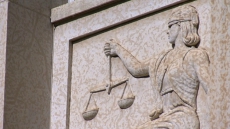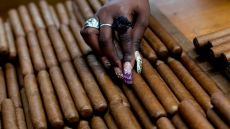VICTORIA — A crumbling, omnipresent red brick building has been a haunting presence for thousands of British Columbia aboriginal people who say they faced physical and sexual abuse at the site.
Many of those who attended see the planned demolition of St. Michael's Indian Residential School as the removal of a cancer that has been eroding the remote Vancouver Island community of Alert Bay.
St. Michael's, operated by the Anglican Church from 1930 to 1975, has been the focus of heart-wrenching community debate for decades. Residents and survivors have tried to decide whether to leave the ominous empty hulk of a building as an example of past wrongs, or knock it down and remove it from sight and, hopefully, memory.
The first church-run residential school in the Alert Bay area dates back to 1882.
A massive survivor ceremony hosted by the Namgis First Nation is scheduled for Wednesday on the school grounds to celebrate the demolition of St. Michael's. It's estimated 160,000 aboriginal children attended the school.
First Nations leaders, Anglican church representatives, political officials and survivors and their families will attend the day-long ceremony. Assembly of First Nations National Chief Perry Bellegarde and BC Assembly of First Nations Regional Chief Jody Wilson-Raybould will also attend.
St. Michael's survivor Robert Joseph said he was six years old when he arrived at the residential school from nearby Kingcome Inlet on the Lower Mainland. He left when he was 19 years old.
He said he still remembers the day he stepped out of the school for good in 1958.
"I walked out the front door and I stood at the top of those front steps and I looked out and the shock hit me," Joseph said. "I had absolutely no idea what I would do with the rest of my life: no sense of purpose, no sense of value. I had learned nothing in this institution and I was a broken boy."
Joseph said he suffered physical and sexual abuse at St. Michael's. It started upon his arrival as a young boy.
"I went through that," he said. "There were far too many children who went through that. As much as I'm optimistic today, it's still not a good memory."
Joseph said he told his story to the reconciliation commission that held residential school hearings across Canada. He said he received a compensation payment from the government but didn't want to discuss the amount.
"Money is never the real question," he said. "It's never enough. But it's the idea that somebody acknowledged that these harms happened."
Today, Joseph acts as a Reconciliation Canada Ambassador to help heal the wounds of the past.
Reconciliation Canada is a charitable, national initiative seeking to promote reconciliation by engaging Canadians in dialogue and experiences that aim to revitalize relationships among Aboriginal peoples and Canadians.
Joseph, who lives in a house in Alert Bay about 225 metres away from the St. Michael's building, said the decision to tear down the building is historic and symbolic.
"It has been a constant reminder of the experiences," he said. "It really has cast a dark shadow for so long. Symbolically, it's a liberation from the haunting past. Symbolically, it's really important for the survivors because it allows us to have hope and optimism."
Joseph said he remembers not wanting to get out of bed when he was at St. Michael's. He said seeing that building come down is a major step towards healing wounds.
"It used to be a place I hated to come to," he said. "But we have to seize the opportunity to celebrate the idea that nobody will ever be treated that way again."
St. Michael's school held aboriginal people from northern Vancouver Island and B.C.'s north coast, including from Bella Bella, Bella Coola, the Nisga'a territories and Haida Gwaii. Former Nisga'a Nation president Joe Gosnell, a well-known treaty pioneer in B.C., spent time at St. Michael's.
Claire Trevena, who represents Alert Bay for the Opposition New Democrats in the B.C. legislature, said the community's decision to demolish the school removes a dark cloud that has hung around far too long.
"There's a sense of haunting about it because it's so imposing," she said. "It's almost like a Victorian prison, out of a work house, out of Oliver Twist or something."





